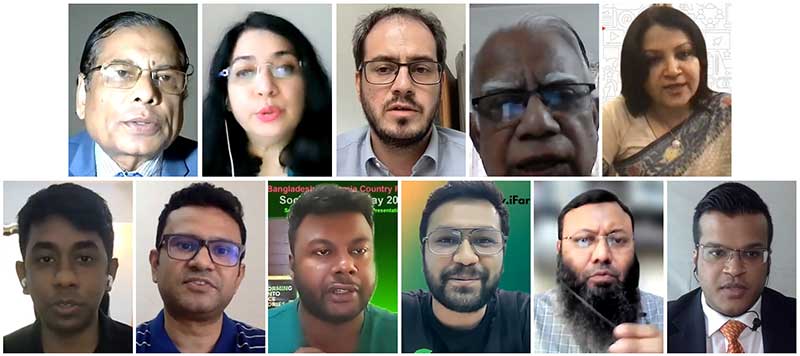The role of digital platforms in the global as well as Bangladesh economy is gradually increasing as one of the key aspects of the fourth industrial revolution (4IR). In line with the improvements in access to the internet and the increase in the availability of smartphones, Bangladesh has seen rapid growth in digital platforms. Recently, business opportunities along with the number of online workers from Bangladesh have increased in various digital platforms, especially during the ongoing COVID-19 pandemic.
Leveraging these observations, the Centre for Policy Dialogue (CPD) and Friedrich-Ebert-Stiftung (FES) Bangladesh Office organised a virtual dialogue on Digital Platform Economy in Bangladesh on Monday, 5 July 2021. The dialogue was held as part of the project titled ‘Future of Work in Bangladesh’ which is being implemented by the CPD, with support from FES, Bangladesh.
The keynote presentation at the dialogue was made by Mr Syed Yusuf Saadat, Senior Research Associate, CPD. Sharing the key findings from the study, Mr Saadat mentioned that Bangladesh is now the second largest supplier of online labour in the world, with a 16% share of the global online workforce. Currently, there are 2,000 web-based entrepreneurs and up to 50,000 Facebook-centric entrepreneurs in Bangladesh. In fact, Business opportunities have increased due to digital platforms particularly during the ongoing COVID-19 pandemic. Around 500,000 jobs are likely to be created through digital platforms in the next one year.

Mr Saadat added that the Bangladeshi workers in the digital platform economy are working from their own motivation and have not received proper training from the education system. Bangladesh’s vast young population could benefit greatly from the digital platform economy if they were properly trained and equipped with market-relevant skills. Moreover, many digital platforms need improvement in their strategic approach and customer services. He also focused on issues such as ensuring the quality of the product, timely delivery of the services, efficient management of the inventory, flexible return policy and overall transparency, will result in greater growth of the digital platform economy in Bangladesh.
Dr Fahmida Khatun, Executive Director, CPD and Mr Felix Kolbitz, Resident Representative, FES Bangladesh office delivered the welcome remarks at the dialogue. In her welcome remarks, Dr Fahmida said that, in order to benefit from the technological advantages of the 4IR, we need to prepare ourselves through better infrastructure, fiscal policies and skilled human resources. Digital platforms, especially e-commerce, are playing an important role in entrepreneurship, consumer expansion and employment generation.
FES Bangladesh’s Resident Representative Mr Kolbitz said that the digital platform economy is a potential sector, and the impact of the digitalisation of the economy in Bangladesh is a policy decision. He hoped that, through this discussion and more such discourses ahead, influential stakeholders would engage and influence to create an enabling environment for these new areas to grow.
Economist Dr M Asaduzzaman said that our perspective should move from market constraints to market expansion. He said that there is a need for continuous technological adaptation in this sector, hence trained and skilled manpower is essential.
Ms Farhana A Rahman, Senior Vice President, Bangladesh Association of Software and Information Services (BASIS) said that adequate policy support is required in terms of remittances in this sector, especially in freelancing. She emphasised on the importance of using domestic platforms in order to expand the local market.
Mr Hossain M Elius, CEO, Pathao Limited mentioned that the primary challenge in this sector is technological limitation. He talked about issues regarding lack of high quality technical manpower, lack of implementation of the regulations and policies, among others.
Ilmul Haque Sajib, Co-founder and COO of Sheba XYZ, added that the business process in the e-commerce sector needs to be made easier and more user-friendly. He also highlighted factors as regards benefits of synchronisation between various authorities and importance of showcasing.
Mr Fahim Uddin Shuvo, Founder and CEO, Garbageman, Mr Fahad Ifaz, Co-founder and CEO, iFarmer, and Mr Mohammad Abdul Matin Emon, CEO of Pulse Healthcare Services and Founder of Doctorola Limited also joined the dialogue as Panelists. Important issues like creation of a regulatory sandbox, blockchain technology, market competition in price control, etc., came up in the discussion.
Professor Mustafizur Rahman, Distinguished Fellow, CPD Chaired the session. He highlighted the importance of digital platforms in advancing the country’s economy, particularly in the context of LDC graduation. He ended the discussion thanking everyone.
The discussion session was attended by policy makers, political leaders, academics, development practitioners, business leaders, civil society activists, international development partners and journalists.


